|
|
|
Sort Order |
|
|
|
Items / Page
|
|
|
|
|
|
|
| Srl | Item |
| 1 |
ID:
105195
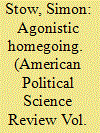

|
|
|
|
|
| Publication |
2010.
|
| Summary/Abstract |
What does the furor over the "politicization" of Coretta Scott King's funeral reveal about contemporary black mourning practices? What does it reveal about black political thought, rhetoric, and practice? Identifying two key modes of mourning and their concomitant conceptions of democracy, this article situates the funeral within a tradition of self-consciously political responses to loss that played a significant role in abolitionism and the struggle for civil rights. Tracing the tradition's origins, and employing the speeches of Frederick Douglass as an exemplar, it considers the approach's democratic value and the consequences of its failure. Arguing that the response to the King funeral indicates that the tradition is in decline, the article locates causes of this decline in significant changes among the black population and in the complex consequences of the tradition's previous successes. It concludes by considering the decline's potentially negative impact, both for African Americans and for the broader political community.
|
|
|
|
|
|
|
|
|
|
|
|
|
|
|
|
| 2 |
ID:
137427
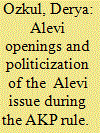

|
|
|
|
|
| Summary/Abstract |
This article reviews recent government efforts to address the “Alevi issue” and identify their successes and failures. It demonstrates that the “Alevi openings” constituted paradoxical processes: tracing various components of the “openings” through news media, it shows that, on one hand, they enabled the “Alevi issue” to be brought to public attention. On the other hand, once Alevis were made more visible in public, non-sympathizers could mobilize their representation for their own ends. These empirical findings have profound theoretical implications. They show that “discursive claims of democratization” at the state level do not necessarily result in democratic mechanisms, which can resolve the demands of a pluralistic civil society. The author argues that what she calls the “tutelary secularism” in Turkey, in other words, the management and disciplining of religious groups, continues under the Justice and Development Party (AKP) rule. This model not only fails, but also produces new sources of conflict in Turkey.
|
|
|
|
|
|
|
|
|
|
|
|
|
|
|
|
| 3 |
ID:
167473
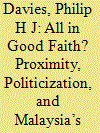

|
|
|
| 4 |
ID:
071233
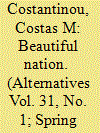

|
|
|
| 5 |
ID:
132312
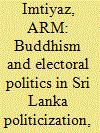

|
|
|
|
|
| Publication |
2014.
|
| Summary/Abstract |
Organized religions often play a significant role in the political affairs of any country when political actors carefully employ them to pursue power. Buddhism is the major religion on the island of Sri Lanka, and often it becomes a powerful symbol for Sinhala-Buddhist politicians. This study examines the interaction between Buddhism and politics in Sri Lanka, and will attempt to examine the religious factors in Sri Lanka's ethnic conflict between the two nations; namely, Tamil and Sinhala. It will examine how the politicization of Buddhism helped Sinhala political elites and leaders in their quest for power, reinforcing religious and ethnic tensions, and finally will discuss some solutions to de-religionize the state structure to help Sri Lanka enjoy the fruits of modernization and democracy.
|
|
|
|
|
|
|
|
|
|
|
|
|
|
|
|
| 6 |
ID:
128070
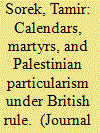

|
|
|
|
|
| Publication |
2014.
|
| Summary/Abstract |
This article explores how political calendars and shared martyrology provided
important markers of identity and symbolic tools for political mobilization in
Mandate Palestine. The dates on the emerging Palestinian calendar grew out of
the politicization and nationalization of traditional holy days, as well as the
commemoration of politically significant events of the period, including those
involving local Palestinian martyrs.
|
|
|
|
|
|
|
|
|
|
|
|
|
|
|
|
| 7 |
ID:
117055
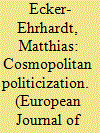

|
|
|
|
|
| Publication |
2012.
|
| Summary/Abstract |
Much of what can be subsumed under the label 'political cosmopolitanism' calls for the empowerment of international institutions because of increased global interdependencies. Surprisingly, however, few scholars have asked whether ordinary citizens share this way of thinking. Do people believe that international institutions are desirable because of their superior capacity to solve transnational problems? To address this question, falsifiable hypotheses about the quality of and scope conditions for a minimally defined 'public political cosmopolitanism' are derived from the literature and tested using the results of a representative survey of German citizens. I show that there is significant support for what I call the 'interdependence model' of cosmopolitan politicization: German citizens' perception of transnational interdependencies (in terms of functional sensitivity as well as moral commitments) fosters beliefs in the capacity of international institutions to solve problems. Remarkably, this relationship is moderated by citizens' sense of their own vulnerability, that is, their beliefs that the national government is incapable of solving such problems. The interdependence model has significant explanatory power, spanning different levels of education, and thus disproves claims that cognitive mobilization is a crucial scope condition for cosmopolitan politicization.
|
|
|
|
|
|
|
|
|
|
|
|
|
|
|
|
| 8 |
ID:
099192
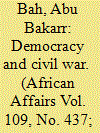

|
|
|
|
|
| Publication |
2010.
|
| Summary/Abstract |
The civil war in Côte d'Ivoire presents unique features with respect to the causes of civil wars and the nature of peace processes in West Africa. It is a conflict largely driven by concrete political and social grievances over citizenship. In addition, it is marked by a significant effort by the belligerents to take ownership of the peace process and negotiate directly. This article traces the civil war to the politicization of citizenship and ethnicity during the democratization process. It argues that the peace agreements engineered by the international community failed to end the conflict largely because they relied heavily on traditional peace formulas and paid insufficient attention to the underlying issue of citizenship. In contrast, the peace agreement forged by Ivorians has been relatively successful because it directly addressed the citizenship issue and restored domestic ownership of the peace process. This article focuses on the peace process and the intrinsic relation between citizenship and progress toward peace in Côte d'Ivoire. In addition, it connects the discourse on democracy in Africa with the salient issue of citizenship and underscores the fluidity of citizenship and democracy in African politics.
|
|
|
|
|
|
|
|
|
|
|
|
|
|
|
|
| 9 |
ID:
149930


|
|
|
|
|
| Summary/Abstract |
The Production Tax Credit (PTC) is an important policy instrument through which the federal government promotes renewable energy development in the United States. However, the efficacy of the PTC is hampered by repeated expirations and short-term extensions, and by the general uncertainty surrounding its future status. We examine the factors driving variation in public support for the extension of the PTC using a nationally representative, internet-based survey. Americans living near a coal-fired power plant are significantly more likely to support extending the PTC than are their peers who are more insulated from the externalities of burning coal. The evidence for this dynamic was strongest and most statistically significant among subjects experimentally primed to think about the adverse health effects of burning coal. Raising awareness of the public health ramifications of generating electricity from fossil fuels holds the potential to increase support for renewable energy policies among those living in proximity to coal plants, even in a highly politicized policy debate.
|
|
|
|
|
|
|
|
|
|
|
|
|
|
|
|
| 10 |
ID:
117543


|
|
|
|
|
| Publication |
2012.
|
| Summary/Abstract |
Redistricting received substantial attention in the popular media in 2011, as states redrew state legislative and congressional district boundaries. Many reformers continue to argue for a de-politicization of the redistricting process, claiming that partisan redistricting is responsible for declining electoral competition and increasing legislative polarization. Our analysis of evidence from state legislatures during the last decade suggests that the effects of partisan redistricting on competition and polarization are small, considerably more nuanced than reformers would suggest, and overwhelmed by other aspects of the political environment.
|
|
|
|
|
|
|
|
|
|
|
|
|
|
|
|
| 11 |
ID:
164950
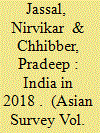

|
|
|
|
|
| Summary/Abstract |
Like the previous year, 2018 was marked by a series of vigilante attacks and gruesome acts of violence against women. The Supreme Court passed important gender-related progressive judgements, yet the institution and other public bodies witnessed unprecedented infighting, scandal, and politicization. The Indian economy showed increased growth. The year witnessed the first major electoral setback since 2014 for the ruling Bharatiya Janata Party, and foreshadowed what will likely be a hotly contested general election in 2019.
|
|
|
|
|
|
|
|
|
|
|
|
|
|
|
|
| 12 |
ID:
118368
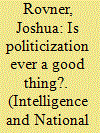

|
|
|
|
|
| Publication |
2013.
|
| Summary/Abstract |
Politicization is the manipulation of intelligence estimates to reflect policy preferences. Policymakers are guilty of politicization if they compel intelligence agencies to alter their conclusions in ways that are politically convenient or psychologically comforting. Intelligence officials are guilty of politicization if they shape their estimates to reflect their own beliefs and preferences. At first glance politicization appears to be an unalloyed hazard: manipulating estimates seems to make bad intelligence inevitable. Nonetheless, some observers argue that under certain circumstances politicization can be a good thing, or at least a necessary risk. Intelligence officials should be willing to take that risk if the alternative means isolating themselves from the policy process and sacrificing any possible influence over policymakers' judgment. They also should be willing to tone down their conclusions on major issues, or withhold estimates on minor ones, in order to avoid offending policymakers. This kind of 'soft politicization' does not mean outright pandering, but it does constrain intelligence leaders from being blunt about estimates that are frankly at odds with policy beliefs and preferences. This article evaluates the possible benefits of politicization and tests it against the historical record. I conclude that politicization - even soft politicization - undermines the quality of threat assessment and does lasting damage to intelligence-policy relations.
|
|
|
|
|
|
|
|
|
|
|
|
|
|
|
|
| 13 |
ID:
132301
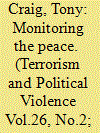

|
|
|
|
|
| Publication |
2014.
|
| Summary/Abstract |
During the Provisional IRA's (PIRA) 1975 ceasefire, two different sets of incident centres were established across Northern Ireland in order to monitor and avert escalation of violence between Republicans and Security Forces. While one group of offices was run by the Northern Ireland Office (NIO) and administered by clerks in the Northern Ireland Civil Service, very quickly Sinn Féin (taking advantage of their decriminalisation in 1974) established their own incident centres to coordinate their communication with the government. This article argues that the establishment of the Sinn Féin incident centres set a precedent for the future political activity of the Provisional Republican Movement; that their activity during the 1975 ceasefire played an important formative role in the evolution of the group's political strategy; and that this experience, acquired from the work done during the 1975 truce, was of far greater influence than is appreciated in current accounts.
|
|
|
|
|
|
|
|
|
|
|
|
|
|
|
|
| 14 |
ID:
163081
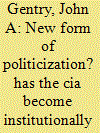

|
|
|
| 15 |
ID:
169207
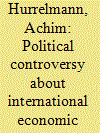

|
|
|
|
|
| Summary/Abstract |
The withdrawal of the UK from the EU, if and when it occurs, will likely imply that Canada must conclude a new bilateral trade agreement with the UK. In light of recent trends toward an increasing politicization of trade negotiations, this policy brief assesses the respects in which a Canada–UK agreement could become politically controversial. Drawing on explanations for the politicization of recent trade deals, it identifies potential flashpoints for political conflict in the Canada–UK trade relationship. It then discusses how policy-makers can channel trade-related controversies into the policy process in an inclusive and evidence-based manner.
|
|
|
|
|
|
|
|
|
|
|
|
|
|
|
|
| 16 |
ID:
097747
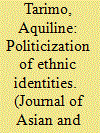

|
|
|
|
|
| Publication |
2010.
|
| Summary/Abstract |
Kenya is encountering many challenges. One of them includes the tendency of manipulating ethnic identities for private interest. We can grasp the root causes of the prevailing ethno-political violence insofar as we take seriously the following questions. How is ethnic identity related to the conflict of loyalties and interests? How have the dynamics of ethnic identities fashioned the existing understanding of the common good and political life? Have Christian churches managed to stand above ethnocentrism and the tension it generates? In search for long-term solutions to these questions this study shows how ill-founded methodologies tend to sideline equal citizenship among citizens in favor of the model of exclusion founded upon ethnocentrism. The challenge of integrating cultural identities in the processes of political integration and democratization is closely related to the problematic concepts of nation-state, citizenship, and common good.
|
|
|
|
|
|
|
|
|
|
|
|
|
|
|
|
| 17 |
ID:
119433
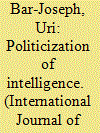

|
|
|
|
|
| Publication |
2013.
|
| Summary/Abstract |
The mistaken October 2002 National Intelligence Estimate of Iraq's weapons of mass destruction (WMD) capabilities, 1 and the claims that it was biased by political pressures, again brought to light the issue of the politicization of analytical intelligence products in democratic states. Top-down politicization is usually defined as "the manipulation of intelligence to reflect policy preferences." 2 More precisely, it is any external intervention in the elements of intelligence work which should be kept objective, autonomous, and free of political influence. Included are three stages of the intelligence process-collection, processing, and production-as well as certain elements of the planning, direction, and dissemination stages, which should be carried out solely on the basis of professional considerations. "External intervention" implies that politicization can be done not only by politicians but also by other consumers of the intelligence product, such as military officers and diplomats.
|
|
|
|
|
|
|
|
|
|
|
|
|
|
|
|
| 18 |
ID:
126155
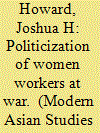

|
|
|
|
|
| Publication |
2013.
|
| Summary/Abstract |
Building on recent scholarship that highlights social change caused by the Anti-Japanese War, this paper traces the politicization of women working in the cotton mills of Chongqing, the Nationalist wartime capital. Upon joining the workforce in the late 1930s, most cotton mill hands were young, uneducated women expected to endure hard work and remain physically confined to the factories. By 1945, women workers were at the forefront of a militant labour movement, writing manifestoes and petitioning government officials. This process of politicization stemmed from their decision to work in factories, which breached societal norms, and their experience of disciplined labour regimes and brutal working conditions, which fostered an incipient class-consciousness. Moreover, Nationalist-sponsored factory education campaigns had the unintended effect of leading women to challenge class exploitation and sexual discrimination. Their participation in the labour movement, which was fuelled by their struggle for economic justice and desire for higher social status, used both legal forms- especially petitions and letters to the press couched in the wartime nationalist rhetoric of shared sacrifice-and extralegal means, namely class violence. The paper concludes that the social changes and conflict that accompanied women's wartime work helped prepare the terrain for Communist rule.
|
|
|
|
|
|
|
|
|
|
|
|
|
|
|
|
| 19 |
ID:
186858
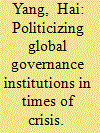

|
|
|
|
|
| Summary/Abstract |
This article examines the politicization of the World Health Organization (WHO) over the course of the coronavirus pandemic (January–December 2020), a paradigmatic case of politicization of global governance institutions. During the pandemic, the WHO was subjected to considerable scrutiny and contestation. This research focuses on politicization at the level of behavior and discourse. Conceptually, it leverages the analytic purchase of politicization and framing. Empirically, it is based on a corpus comprising 505 texts gathered from key actors involved. The analysis not only lays bare the varying demands and arguments vis-à-vis the WHO, but foregrounds the broad consensus among the actors examined (barring the Donald Trump administration) on the imperative to support the organization. Additionally, seven distinct frames on the WHO are identified: Puppet, Handcuffed, Scapegoat, Irreplaceable, Botched, Comme il faut, and Battleground. Together, they offer a holistic overview of the diverse perspectives on the WHO and its pandemic response.
|
|
|
|
|
|
|
|
|
|
|
|
|
|
|
|
| 20 |
ID:
178556


|
|
|
|
|
| Summary/Abstract |
International institutions are increasingly being challenged by domestic opposition and nationalist political forces. Yet, levels of politicization differ significantly across countries facing the same international authority as well as within countries over time. This raises the question of when and why the mass public poses a challenge to international cooperation. In this article, we develop a theoretical framework for understanding the nature and implications of politicization of international cooperation, outlining three scope conditions: the nature of public contestation, the activities of political entrepreneurs, and the permissiveness of political opportunity structures. By empirically examining these scope conditions, we demonstrate that politicization can have both stabilizing and destabilizing effects on international cooperation. Highlighting the systemic implications of politicization for international cooperation has important implications for international relations scholarship. Although international organizations may face challenges, they also have ways of being remarkably resilient.
|
|
|
|
|
|
|
|
|
|
|
|
|
|
|
|
|
|
|
|
|